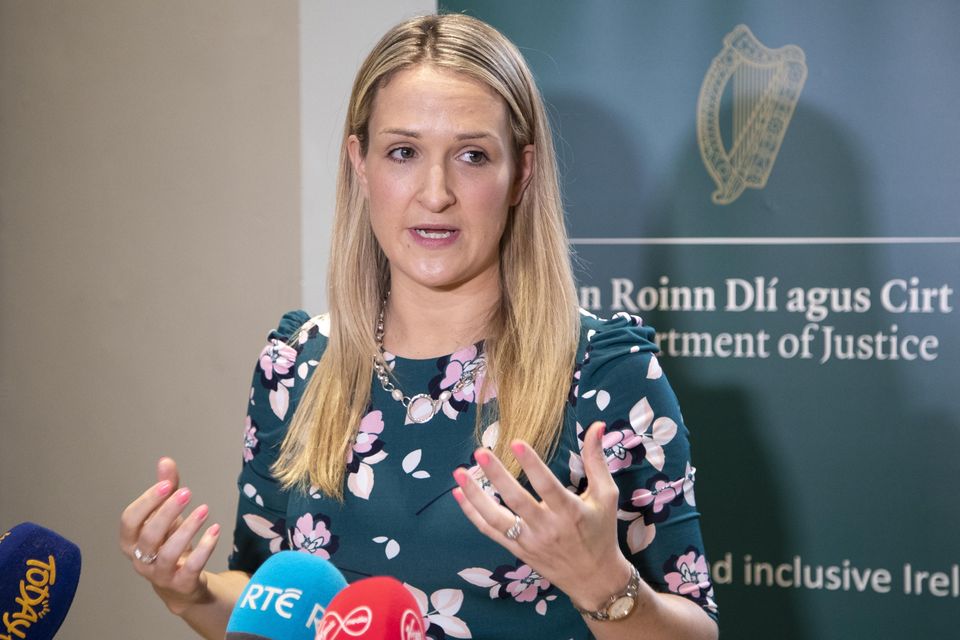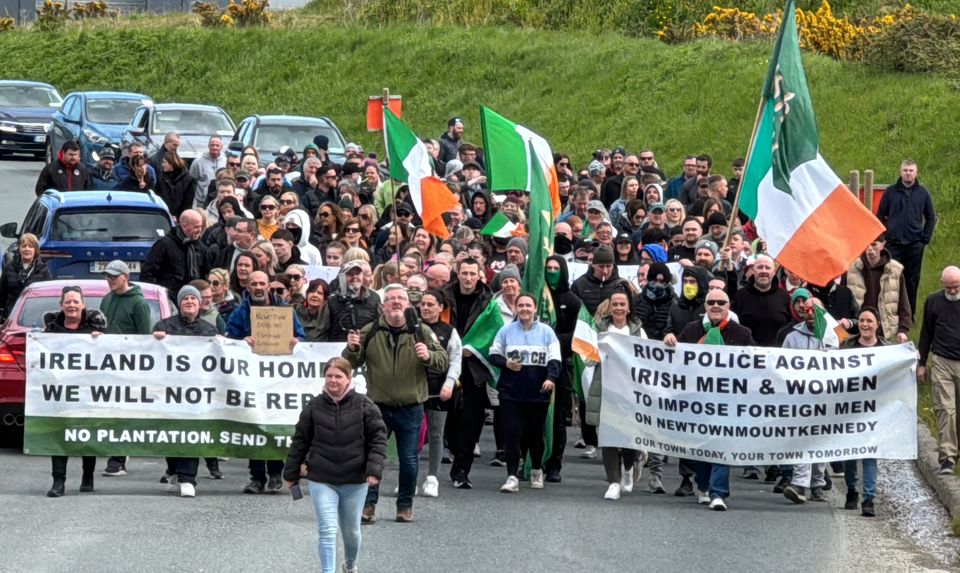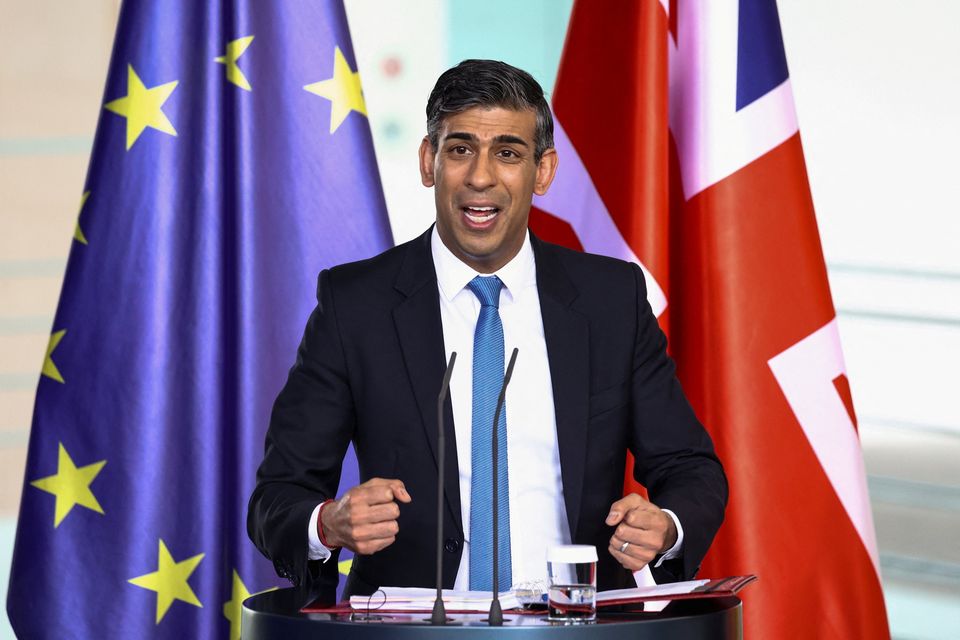Ministers scramble to shut ‘back door’ of asylum-seekers arriving via Northern Ireland
Accelerated process will give migrants a three-month deadline
Helen McEntee will tomorrow meet her UK counterpart to discuss migration. Photo: Collins
Asylum-seekers who arrive in Ireland from Britain through the “back door” of Northern Ireland risk being returned to their country of origin under a fast-track processing system for international protection applicants introduced by the Government.
After admitting there is a spike in migrants arriving via the UK, the Government is now scrambling to address the rising immigration “crisis”.
Last week there were violent protests outside a prospective asylum centre in Co Wicklow.
The Sunday Independent can today reveal that central to this plan will be the threat to asylum-seekers that they could be given deportation orders within three months unless they can prove they are entitled to international protection.
Today's News in 90 Seconds - April 28th
The fast-tracked asylum process is being extended from just applying to arrivals from countries deemed safe to include those from countries designated unsafe but with the highest volume of applicants.
“The extension of accelerated processing to whatever country has the highest number of applicants will mean that many of those coming from the UK will receive an interview date when they arrive and a first decision within 90 days,” a senior government source said.
“Faster decision-making means those with a right to protection get it faster, but it also means those without a right can be returned more quickly.”
Protesters march outside Newtownmountkennedy, Co Wicklow, yesterday. Photo: Frank McGrath
This week, Justice Minister McEntee will seek cabinet approval to urgently draft emergency legislation to allow her to return asylum-seekers to the UK after the High Court ruled it was unlawful to designate our nearest neighbour as a safe country.
The State is appealing the ruling, but Attorney General Rossa Fanning is drafting a “legislative fix” to ensure deportations can resume this summer.
Read more
However, migrants arriving in Ireland without status in the UK face being returned to their country of origin if they cannot prove they are deserving of international protection.
It comes as British prime minister Rishi Sunak claimed the rise in migrants travelling from Britain to Ireland was proof the UK’s controversial plan to send illegal immigrants to Rwanda was working.
Mr Sunak’s comments followed Tánaiste Micheál Martin saying he believed the UK’s asylum policy is driving migrants in fear of being deported to Rwanda across the border from Northern Ireland into the Republic.
British prime minister Rishi Sunak. Photo: Liesa Johannssen/Reuters
At an Oireachtas Justice Committee hearing last week, Ms McEntee said around 80pc of asylum-seekers arriving Ireland were currently coming through the Northern Ireland Border and said most were of Nigerian origin.
Ms McEntee will tomorrow meet British home secretary James Cleverly to discuss the increasing numbers of migrants traveling from Britain to Ireland.
A government source said there were regular meetings between the Home Office and the Department of Justice on strengthening and preventing abuse of the Common Travel Area between Britain and Ireland.
There are also ongoing operations between the Garda National Immigration Bureau (GNIB) and the PSNI, seeking to clamp down on illegal migration into the State.
Last Tuesday, Cabinet signed off on plans to allow the immigration service to fast-track applications of people seeking asylum from countries deemed unsafe.
Prior to this, only arrivals from safe countries could be processed this way. Now people coming from designated unsafe countries with the highest volume of asylum-seekers face the same processes as those from safe countries.
The Government insists the EU Migration Pact will make it easier to return asylum-seekers
A spike in Nigerians claiming international protection since the start of the year means all arrivals from the country face fast-track processing, which could see them ordered back to their country of origin.
The Government believes a large volume of Nigerian asylum-seekers are travelling from Britain to Ireland to seek international protection due to fears of being deported by the UK government to Rwanda, following the passing of a controversial agreement between the two countries.
The introduction of the accelerated processing system over a year ago has already had a significant impact on reducing the number of asylum-seekers seeking protection from countries designated as safe.
Government figures show a 50pc drop in applicants from safe countries since the fast-track scheme was introduced.
The Government is also in the middle of a tender process to procure a charter plane to return unsuccessful international protection applicants.
The Government is also insisting the EU Migration Pact will make it easier to return asylum-seekers, if they have received status in another.
However, Aontú leader Peadar Tóibín told the Sunday Independent he believed there should be a referendum on the EU pact.
“This is an agreement of such significance, in terms of the loss of sovereignty and the potential cost to this country, that I strongly believe the people should have a say on it,” he said.
“I asked Taoiseach Simon Harris how much the deal would cost the Irish taxpayer — and he said he didn’t know. If I was looking for a grant to put a bench in a public park I’d have to get three costings, but we’re blindly signing up to the Migration Pact. It doesn’t make sense.”
Read more
Join the Irish Independent WhatsApp channel
Stay up to date with all the latest news

















